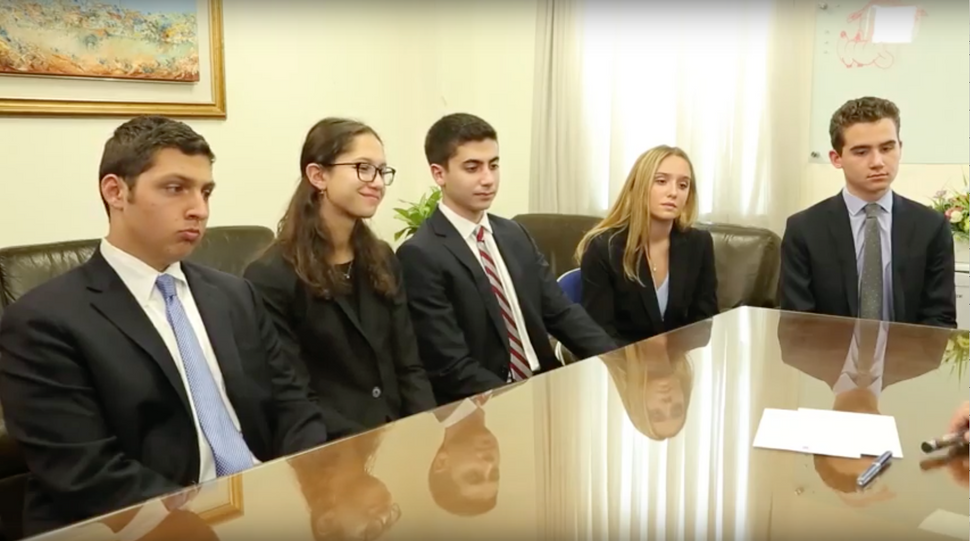WATCH: How These Five High Schoolers Got To Interview Netanyahu

Image by Youtube Screenshot
One week before President Donald Trump’s visit to Israel, I, along with four other American Jewish teenagers, had our own private meeting with Prime Minister Benjamin Netanyahu. At the age of 15, when I began to wrestle with the complexities of the Israeli-Palestinian conflict, I could never have imagined my questioning would lead me to the office of the Israeli Prime Minister.
In August 2014, Israel was at war with Hamas and besieged in the news and on social media. As our family dinner conversations focused on the conflict, I became more aware of the fault lines around a country I’d been raised to love. What I knew about Israel, based on my parents’ and grandparents’ commitment to its prosperity and security, and my own meaningful visit in 2012, was not reflected in these news reports. I wanted to be able to reconcile this conflicting information, but I needed a credible, reliable source to educate me in a way that would allow me to form my own opinions.
That fall, I began to imagine a program that could inform high school students in a way that didn’t whitewash the discord around Israel, but explained it with the full context of history. I reached out to AJC, the global Jewish advocacy organization that builds bridges through constant conversations with those who are not always like-minded.
Together, we conceived a program that would be, first and foremost, about learning the multiple narratives and engaging in honest dialogue. It could not be an indoctrination espousing why Israel was blameless. I already knew that Israel was not always right, but I also knew that Israel is not always wrong. This program needed to be a place where students could unpack these seemingly intractable issues from every angle.
In September 2015, AJC launched the inaugural Leaders for Tomorrow (LFT) class with 25 New York City high school students. First year participants were selectively invited to build a cohort of intellectually curious students who had shown leadership in their communities. Now, interested students can apply on AJC’s LFT webpage.
During LFT’s first year, we heard from renowned experts, Jewish community professionals, and academics who presented a nuanced understanding of Israel’s foundational principles and its relations with its Arab neighbors. We learned to sort out the seemingly endless myths and facts, and the competing narratives. We were able to form more nuanced opinions about issues such as territorial disputes, borders, defense, and what it means to build and maintain a democracy in the Middle East. We came away with an appreciation for the struggle of creating and sustaining the State of Israel, something many of us had taken for granted. Through the process of recognizing faults, while appreciating strengths, I was able to begin to understand these issues and started to think differently about resolutions and a way forward.
With AJC’s access to global world leaders, last year, the first LFT class was hosted by the French Consulate and, this April, 37 LFT students dined with Ambassador Takahashi, Japan’s Consul General and seven members of his staff at his residence. In these discussions, we were able to employ our listening skills and ask influential government representatives our own questions regarding their relations with the United States and Israel.
Having had real world advocacy experience, I will admit that I was still nervous sitting outside the Prime Minister’s office. But, after spending two years wrestling with the complexities and learning how to engage in diplomatic dialogue, I felt confident that I could speak with conviction about beliefs that were mine, not passed down by my parents or others. We talked about Israel’s relationship with American Jewry, Israel as a bipartisan issue, Israel’s growing relations with the Gulf states, and the heightened fractures on college campuses – a place where we LFT graduates are headed in September.
Our conversation with the Prime Minister left us feeling reassured that our education and training would serve us, Judaism, and Israel well. LFT is not about creating puppets to say the right words when we arrive on campus. The conversation cannot be about “us” versus “them.” It needs to be about “us and them.” I can be passionate and vocal, but unless I know the history, understand the perspective of the other side, and am willing to engage with alternative narratives, I will only perpetuate the cycle of divisiveness.
As I leave to attend college, LFT will be entering its third year in New York, second year in Chicago, and expanding to Westchester and Atlanta. The impact LFT has had on the 80 students who have participated so far has been meaningful and enduring. I am hopeful that the dialogue that seemed so elusive and fraught may start to broaden and connect more of us who feel strongly about representing Israel frankly and fairly.

















